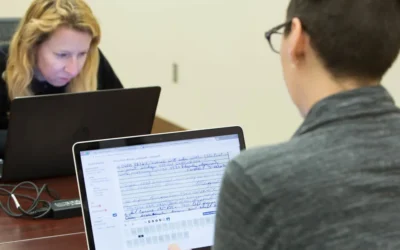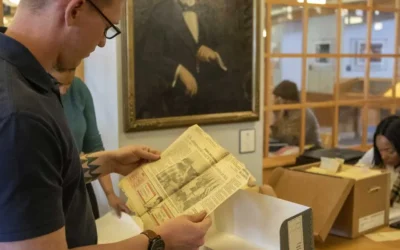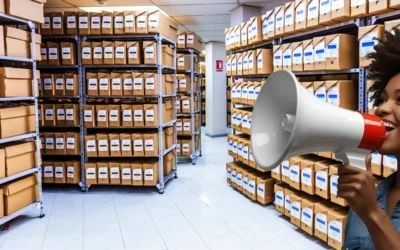Archival Communication, Outreach, and Training
Margot Note
Communications and outreach are an essential part of any archival program. Like politicians, archivists need to develop talking points to stay “on message.”
The ways to spread the word are varied, and archivists can be creative and have fun communicating their holdings’ value.
Outreach
As I define it, outreach is a personal attempt to reach out to various constituencies or would-be constituencies. Attending meetings, both within the organization and with external groups, is an effective way to get to know people and get the word out. Teambuilding with other information professionals and stakeholders is a part of the program. These are simple ideas, but the problem is that they are time-consuming; outreach in a large organization can consume all of an archivist’s time. Examples of outreach include creating a website or a webpage, scheduled emails, quarterly newsletters, committee work, and one-on-one meetings to build cooperation. Outreach methods will depend on organizational culture. The bottom line is that current and potential archival users need to know that the archival program exists and can be relied on to come to their assistance whenever needed. If outreach is done right, others will soon be passing on the archival message, and the archives program will have built support and multiplied its spokespersons.
Archival Training
Training is closely related to communications and outreach. Training may occur in a variety of methods. The first is general awareness training. All users can benefit from archival management awareness training of some type. Training is brief with top-level concepts. Specialized training for users with specific responsibilities or needs is a more narrowly focused training. Archivists can build on the general training and focus on the needs of specific groups.
Understanding the Culture
Archivists must understand the existing environment and then determine how to change one or more aspects to improve the archival program. For example, if the organization and culture of the organization do not support archival management, the archivist may choose to strengthen the program’s basis in policy and governance. Alternatively, the archivist may turn to the education of the employees or to improving the IT infrastructure so that the role of the employees in documenting their activities and preserving records of enduring value is minimized.
Archivists need to be satisfied with good enough archival management. Organizations do not exist to create and manage records; they exist to perform some function: making money for shareholders, providing services, or protecting national security, for example. Given that fact, what is good enough archival management? The concept of “good enough” means that the basic requirements are covered. Records of enduring value should have sufficient authenticity, integrity, reliability, usability; are identified, organized, and retrievable; and are shareable, interoperable, and protected.
Implementing and supporting an archival program requires that the organizational processes be thoroughly understood and that the culture supports archival management. As much as archivists need to communicate archival values to reach new audiences, they also need to understand the perspectives of records creators.
Communicating Value
Communicating archival value depends on the organization and its culture. How an organization views its records (and the archives program) is critical to success. People are crucial as well. If they are well trained in creating and managing records, the archivist’s job is simplified. If they resist supporting the archives, the program will have difficulty succeeding. The third concept of effective archival communication is infrastructure. Any attempt to manage records will be aided or hindered by the established infrastructure. If there is no effortless way to declare something a record, separate necessary from unnecessary ones, preserve records long term, or search across records, managing records effectively will be difficult if not impossible. Even if the culture supports archival management and the people are willing, the tools need to be in place. Organizational support, invested people, and solid infrastructure allows archivists to continue their mission of preserving records of enduring value.
Margot Note
If you’re interested in this topic and eager to learn more, please join us for “Reach New Archival Audiences: Optimize Communication”, the fourth in a new series to be presented by Margot Note. It’s on Wednesday, April 20, 2022 at 11 a.m. Pacific, 2 p.m. Eastern. (Can’t make it? Register anyway and we’ll send you a link to the recording and slides afterwards). Register now or call 604-278-6717. And check out ArchivEra, our archival collections management software built for today’s challenges and tomorrow’s opportunities.
Never miss another post. Subscribe today!
Similar Posts
Collaborative Archival Relationships
Collaborative projects are instrumental in showcasing how archival collections can benefit various organizational departments.
Informational, Evidential, and Intrinsic Values within Archives
Archives provide authentic, reliable information and hold values that reflect their functions and uses; informational, evidential, and intrinsic.
A Sustainable Archives
Archivists prioritize sustainable practices and policies, rooting their work in ethics of care, often preferring digital processing and preservation
Archival Branding and PR Strategies
Archivists who adopt branding and PR strategies both safeguard historical treasures and contribute to their organizations’ evolution.




Leave a Comment
Comments are reviewed and must adhere to our comments policy.
0 Comments